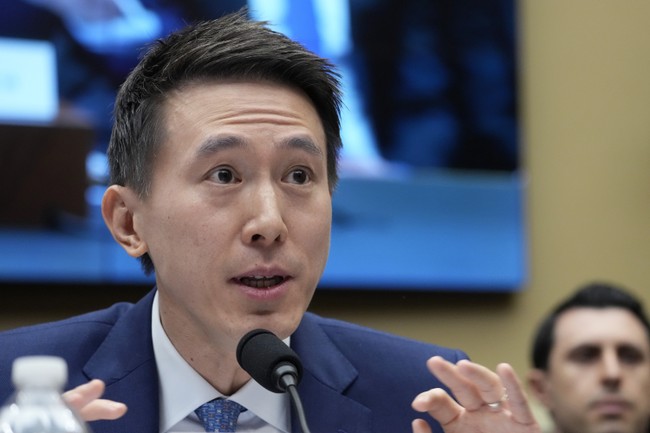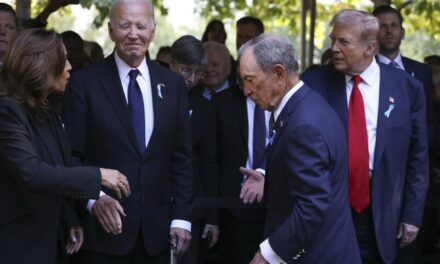We support our Publishers and Content Creators. You can view this story on their website by CLICKING HERE.

Back in April, congress passed (and president Biden signed) a law which gave the Chinese-owned social media site TikTok until January 2025 to either sell its US business or be banned. In May, TikTok sued in an attempt to get a court to overturn the new law on the grounds that it violated the First Amendment rights of Americans.
Advertisement
TikTok said the law violated the First Amendment by effectively removing an app that millions of Americans use to share their views and communicate freely. It also argued that a divestiture was “simply not possible,” especially within the law’s 270-day timeline, pointing to difficulties such as Beijing’s refusal to sell a key feature that powers TikTok in the United States.
“For the first time in history, Congress has enacted a law that subjects a single, named speech platform to a permanent, nationwide ban, and bars every American from participating in a unique online community with more than one billion people worldwide,” the company said in the 67-page petition, which initiated the lawsuit. “There is no question: The act will force a shutdown of TikTok by Jan. 19, 2025.”
Today, oral arguments were held before a three judge panel of the U.S. Court of Appeals and lawyers for TikTok made their case.
In a two-hour hearing, lawyers for TikTok argued that its current business structure is protected by its free speech rights under the First Amendment and that the government’s argument against Chinese influence over TikTok’s algorithms is unsupported.
“The government is just flat wrong,” TikTok’s lawyer, Andrew Pincus said. “The recommendation engine itself is influenced in the U.S., it’s trained in the U.S. on U.S. data, it’s modified in the U.S. based on U.S. content moderation decisions.”…
Pincus also said that the data TikTok collects from American users is anonymized and is comparable to other Chinese companies, like major e-commerce platforms.
Advertisement
But by most accounts, the oral arguments did not go very well for TikTok. At least two of the three judges expressed skepticism of the claims being made by the company.
Two of the judges expressed some skepticism around TikTok’s arguments that Congress lacks the authority to pass such a law, and its defense that it was being unfairly singled out. Neomi Rao, one of the judges, said the company’s legal position relied on “a very strange framework for thinking about” congressional authority.
Douglas Ginsburg, another judge in the case, said, “It’s a rather blinkered view that this statute view just singles out one company.”…
“It was pretty brutal for TikTok — very little went TikTok’s way,” said Alan Rozenshtein, an associate professor at the University of Minnesota Law School. The court sounded “frankly skeptical of TikTok’s request for it to really second-guess the government.”
The US government’s response to TikTok’s argument was merely to point out that TikTok’s source code, its algorithm, was created in China. In fact, China’s Byte Dance cited unwillingness to release that code as one reason it couldn’t possibly sell the US division to someone else. The Chinese government backed them up, saying they wouldn’t allow the sale.
Advertisement
“It’s just that the curation is happening abroad,” he said to Daniel Tenny, a lawyer representing the US government.
“The core point we’re making is one they’ve conceded,” Tenny told the court, “which is that [TikTok’s] code is made in China.”…
Tenny, the Justice Department attorney, described the law’s impact on Americans’ First Amendment rights as “incidental” to the legislation’s main purpose, which focuses on curbing foreign influence over TikTok’s algorithm…
Last year, the Chinese government said it would “firmly” oppose a potential sale of TikTok from ByteDance, following new export controls the country announced that affect the transfer of certain software algorithms.
As I pointed out a few months ago, the fact that the Chinese government has the final word in TikTok’s sale really undermines the argument that this is just a silly social media site which no one should be getting worked up about about. Clearly, China doesn’t see it that way.
It’s worth noting that most US social media sites are banned in China and China insists on maintaining complete control of the Chinese equivalent sites that do exist. In practice that means a small army of government monitors can delete any discussion of any topic at any time and frequently does so. People who stir up trouble online in China are likely to get a visit from the local police.
Advertisement
Of course America runs very differently which is how TikTok became a leading US social media site in the first place. Still, the hypocrisy of a Chinese-owned company demanding protection from an act of congress by citing the First Amendment can’t be overstated.

 Conservative
Conservative  Search
Search Trending
Trending Current News
Current News 







